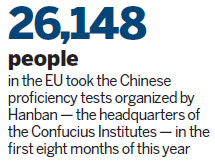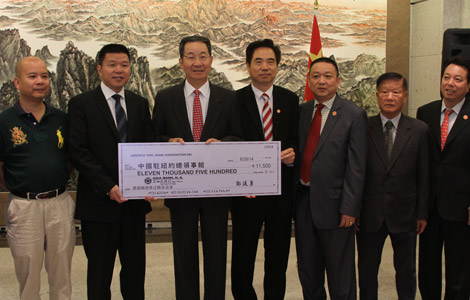More put learning Chinese to test in European Union
Updated: 2014-08-29 07:36
By Zhu Chengpei and Zhang Xiaomin in Dalian(China Daily)
|
||||||||

More people in European Union countries have taken Chinese-language proficiency tests in recent years, an official at Hanban - the headquarters of the Confucius Institutes - said on Thursday.
"The EU is expected to be the largest market following the Republic of Korea, Japan and Singapore," Hu Zhiping, deputy director-general of Hanban, told China Daily on the sidelines of a meeting at Dalian University of Foreign Languages in Liaoning province.
The testing center in Madrid, the Spanish capital, said the annual number of candidates taking two Chinese-language tests had risen from 163 in 2009 to 3,474 in 2013.
The tests are the HSK (Hanyu Shuiping Kaoshi) and YCT (Youth Chinese Test).
There are 164 testing centers in the EU. In the first eight months of this year, 26,148 people in the EU took the Chinese proficiency tests organized by Hanban.
In the latest HSK test held this month, Daniel Miller from Britain became its millionth candidate and was awarded a one-year scholarship by Hanban to study in China.
"I like ancient Chinese philosophers. English translation cannot express their thoughts completely. Now, when I'm learning Chinese, I can better understand Chinese culture," Miller, 22, told China Daily.
The University of Nottingham graduate said he will study Chinese philosophy or culture at Peking University or Fudan University after obtaining his master's degree.
The HSK test was launched in 1984 and is aimed at overseas students who want to study in China.
In 2004, after Hanban was established, the first Confucius Institute was opened in Seoul, the South Korean capital.
Hanban has since set up institutes worldwide and introduced some reforms to the teaching and testing system for non-native Chinese learners.
It developed three tests - HSK, YCT and BCT (Business Chinese Test) - to help assess candidates' Chinese-language ability.
In 2010, 175,000 Chinese-learners took the tests, with the figure rising to 372,000 in 2013.
Hu said growing economic and trade ties with China in different countries had promoted the establishment of Confucius Institutes, accelerating the popularity of learning Chinese.
There are 459 Confucius Institutes and 713 Confucius classes in 122 countries and regions as well as 875 Chinese testing centers in 114 countries and regions.
"Compared with the dominant English-language market, we are still at the early stage of making Chinese popular," Hu said.
He said that in some countries, government institutions, enterprises and various institutes had started to regard Chinese as an option in assessing would-be employees.
Hanban is encouraging its overseas testing centers to cooperate with local institutions to expand the market, Hu said.
"For example, by considering the specific demands of a local enterprise, we can provide a customized service for it to evaluate the Chinese-language levels of its potential employees," he said.
Hu also said he had noticed that some Internet users pose extremely difficult questions to play tricks on non-native Chinese speakers.
"The real examinations are much easier," he said. "From Level 1 to Level 6, we are setting questions in line with the ability of our candidates."
Hu said 500,000 people globally are expected to take the three mainstream tests organized by Hanban this year, and the number will reach 1 million annually in five years.
Contact the writer at zhuchengpei@chinadaily.com.cn
Most Viewed
Editor's Picks

|

|

|

|

|

|
Today's Top News
US, China to parley on extradition of criminals
US rice could see potential market in China
China accuses US over 'close-in reconnaissance'
EB-5 visa ceiling is short-term, expert says
China and US in talks on code of conduct
Chicken market gets a boost
Microsoft 'not fully open with sales data'
Lawmakers in move to tackle espionage threat
US Weekly

|

|















